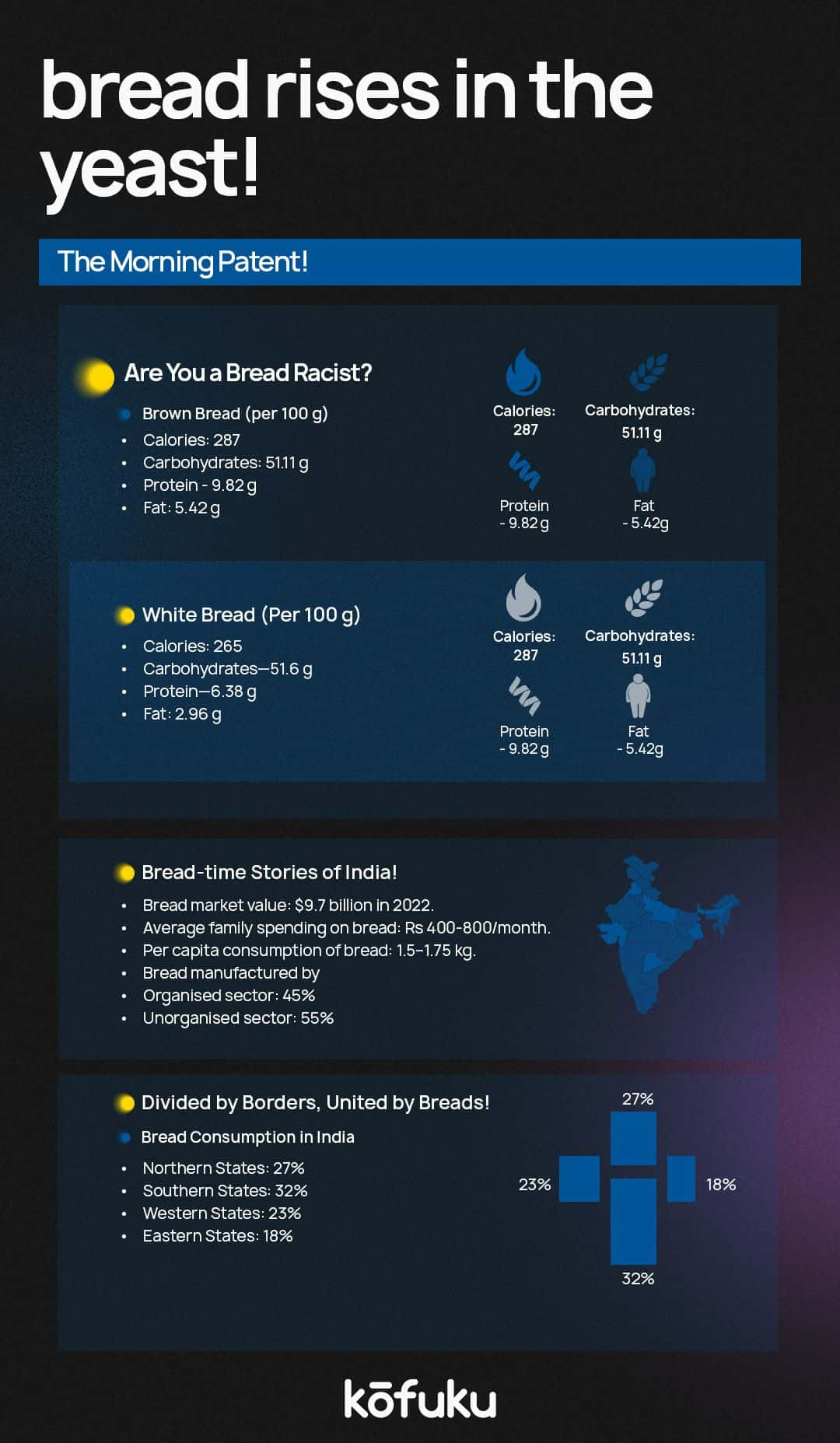Effects Of Eating Too Much Bread: A Wake Up Call

Introduction
We know this will be a hard pill to swallow, but bread does more harm than good when consumed in excess. It's a staple in many cultures, a comfort food even. Heck most of us love a plate of perfectly brown toasts with our morning coffee from time to time.
But, like most good things in life, too much of it can have some sneaky health implications. Yes! Today, Kofuku is taking on the daunting task of educating you on the effects of eating too much bread.
Breaking Bread: Why Can Bread Be Bad (If Taken in Excess)?
Bread has been a part of our diets for centuries, so why the sudden scrutiny? Well, the issue isn't bread itself, but rather the type of bread we often consume and the quantity we devour.
Modern bread, especially the refined white variety, has undergone significant processing. This process strips away many of the natural nutrients like fibre, vitamins, and minerals, leaving behind primarily carbohydrates.
Think of it like this: imagine a field of wheat. Whole wheat bread is like using the entire field – the grain, the bran, the germ – everything. White bread, on the other hand, is like only using a small portion of the field, discarding the rest. You're losing out on some serious nutritional goodness!
This type of processing bread naturally leads to a few problems:
1. Rapid Sugar Spike: Refined carbs in white bread are quickly converted into sugar in the bloodstream, leading to a spike in consumers’ aka your blood sugar levels.
2. Nutrient Deficiency: The refining process removes essential nutrients, leaving the bread less nutritious.
3. Low Fibre: Fibre is crucial for digestion, satiety, and overall health. White bread is notoriously low in fibre.
So, while the bread isn't inherently evil, consuming too much refined bread can contribute to various health issues.
Health Risks of High Bread Consumption
Now that we know who the real culprit is (read: refined bread) here are some of the negative effects of overconsumption of bread:
Weight Gain:
Refined bread is high in calories and low in fibre, which can lead to overeating and weight gain. Those blood sugar spikes we talked about? They can also lead to energy crashes and cravings, making it harder to manage your weight.
Blood Sugar Imbalance:
The rapid sugar spike from white bread can lead to insulin resistance over time, increasing the risk of type 2 diabetes. This is a serious concern, as one in four people with diabetes are from India, making it the most affected country in the world.
Digestive Issues:
Low fibre intake can literally decimate your digestive system, leading to constipation, bloating, and other unpleasantries. Fibre acts like a natural broom for your gut, keeping things moving smoothly.
Impact on Cholesterol Levels:
High consumption of refined carbs can contribute to elevated levels of "bad" cholesterol (LDL) and lower levels of "good" cholesterol (HDL), increasing the risk of heart disease.
Heart Disease Risk:
Speaking of heart diseases, all the factors we've discussed – weight gain, blood sugar imbalance, and cholesterol issues – contribute to an increased risk of heart disease, a leading cause of death globally. The WHO estimates that cardiovascular diseases are responsible for approximately 17.9 million deaths each year.

White Bread vs. Whole Grain
The difference between white bread and whole grain bread is like night and day. Whole grain bread, made with the entire grain kernel, is a family pack of nutrition. It's full of fibre, vitamins, minerals, and antioxidants.
And White bread, as we know, is mostly a stripped-down version, lacking many of the essential nutrients.
A 2016 study found that consuming whole grains is associated with a reduced risk of heart disease and certain types of cancer. So, choosing whole-grain bread is a simple but powerful way to improve your health.
Bread in a Balanced Diet
Yes, bread can absolutely be part of a healthy, balanced diet. The key, of course, is moderation and choosing the right kind.
Portion control, in that regard, is crucial. Instead of mindlessly munching on bread throughout the day, be mindful of how much you're consuming. Think of it as a side dish, not the whole meal.
One of Kofuku’s personal bread intake recommendations is not to follow a generic limit. This is no one-size-fits-all scenario. It all very much depends on your individual health needs, activity level, and overall diet.
That being said, a good starting point is to limit your intake of refined bread and prioritise whole-grain options. Listen to your body, pay attention to how you feel after consuming bread and take it from there.
Healthier Bread Alternatives
What better way to manage your bread consumption than by switching it out for some healthier alternatives?
1. Roti/Chapati (Whole Wheat): These unleavened flatbreads are the staple of our cuisine and are also a great source of fibre when made with whole wheat flour.
2. Missi Roti: Made with a blend of flour like whole wheat, gram flour (besan), and sometimes maize flour, Missi Roti has loads of nutrients.
3. Paratha (Whole Wheat): While often made with oil or ghee, whole wheat parathas can be a good source of fibre. Try using less oil for a healthier version.
4. Dosa (Fermented): Made from rice and lentil batter, Dosa is a fermented food that's easier to digest and offers some probiotics.
5. Idli (Steamed): Another South Indian favourite, idli is steamed and low in fat, making it a healthy option.
6. Brown Rice: While not technically bread, brown rice is a great source of complex carbohydrates and fibre.
7. Oats: Oats are a fantastic source of fibre and can be incorporated into your diet in interesting and delicious ways, like porridge or as a flour substitute in some recipes.

Conclusion
All that to say Bread really isn't the enemy, but it's only turned into one when you don't choose the right kind or consume it in moderation. By opting for whole grain varieties, being mindful of portion sizes, and exploring healthier alternatives, you can continue to enjoy bread as part of your diet.
Here's to an informed and healthier you!
FAQs
How much bread is too much bread?
For one single person, consuming half a loaf of bread over a period of 1 day is enough.
Do I accompany bread with something?
Yes, you can try accompanying your bread with butter, jam or marmalade, depending on your tastes.
Can eating too much bread cause weight gain?
Yes, consuming excessive amounts of bread, significantly refined white bread, can contribute to weight gain. Bread is high in carbohydrates, and eating too much can lead to an excess of calories, which the body stores as fat.
Is bread bad for digestion?
Too much bread, particularly varieties made with refined flour, can cause digestive issues. These pieces of bread lack fibre, which is essential for healthy digestion. Overconsumption can lead to constipation, bloating, and discomfort.
Can eating too much bread cause blood sugar problems?
Yes, regular consumption of large amounts of bread, especially white or refined bread, can cause spikes in blood sugar levels. This can lead to insulin resistance over time, increasing the risk of type 2 diabetes, particularly in people who are already at risk.






